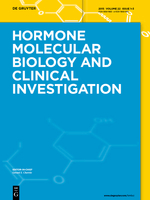
JOURNAL OF STEROID BIOCHEMISTRY AND MOLECULAR BIOLOGY
metrics 2024
Advancing the Frontiers of Steroid Science
Introduction
JOURNAL OF STEROID BIOCHEMISTRY AND MOLECULAR BIOLOGY is a distinguished peer-reviewed journal published by Pergamon-Elsevier Science Ltd, committed to advancing the fields of biochemistry, molecular biology, and endocrinology. With an ISSN of 0960-0760 and an E-ISSN of 1879-1220, this journal has garnered a notable reputation, securing a Q2 ranking in numerous categories, including Biochemistry, Cell Biology, and Clinical Biochemistry, as of 2023. Hailing from the United Kingdom, it serves as a critical platform for the dissemination of impactful research from 1990 to 2025 and beyond. Although it does not currently offer open access options, the journal's comprehensive coverage and rigorous peer review process ensure high-quality publications that significantly contribute to the understanding of steroid biochemistry and related fields. Targeting a diverse audience of researchers, professionals, and students, the journal remains an essential resource for those seeking to stay at the forefront of scientific innovation and discovery.
Metrics 2024
 0.93
0.93 2.70
2.70 3.60
3.60 144
144Metrics History
Rank 2024
Scopus
IF (Web Of Science)
JCI (Web Of Science)
Quartile History
Similar Journals

ENDOCRINE JOURNAL
Driving breakthroughs in endocrine research and therapy.ENDOCRINE JOURNAL, published by the Japan Endocrine Society, is a pivotal resource for researchers and professionals in the field of endocrinology, diabetes, and metabolism. With a long history dating back to 1954, this journal encompasses a comprehensive range of topics including hormonal regulation, pathophysiology of endocrine diseases, and innovative therapeutic approaches. Despite its classification as open access, the journal remains a beacon of knowledge, with impressive rankings—Q2 in Endocrinology, Diabetes and Metabolism and Q3 in Endocrinology for 2023—ensuring it is a respected source in the academic community. It serves as a critical platform for the dissemination of cutting-edge research, encouraging collaboration and facilitating advancements in understanding complex endocrine disorders. By subscribing to this journal, researchers and students gain access to seminal studies, clinical insights, and a wealth of information that drives this vital field forward.

Forensic Toxicology
Pioneering Research in Forensic ToxicologyForensic Toxicology is a premier journal published by Springer, renowned for delivering cutting-edge research in the realms of toxicology, biochemistry, and forensic medicine. With an ISSN of 1860-8965 and an E-ISSN of 1860-8973, this journal has established itself as a significant resource for professionals, researchers, and students engaged in the analysis of toxic substances within a forensic context. Its impressive impact factor and ranking reveal its influential presence in the field, particularly as it is categorized in Q1 for Pathology and Forensic Medicine and Q2 for Biochemistry (Medical) and Toxicology. Featured articles span a wide array of topics, facilitating interdisciplinary collaboration and advancing scientific knowledge. While currently not an open-access journal, it remains accessible through institutional subscriptions. With a convergence span from 2006 to 2024, Forensic Toxicology is committed to publishing high-quality research that enhances the understanding of toxicological phenomena and their implications in forensic investigations, reinforcing its role as an indispensable resource in the scientific community.

BIOCHEMICAL AND BIOPHYSICAL RESEARCH COMMUNICATIONS
Unveiling the complexities of molecular life.BIOCHEMICAL AND BIOPHYSICAL RESEARCH COMMUNICATIONS, published by Academic Press Inc Elsevier Science, stands as a leading periodical in the fields of biochemistry, biophysics, cell biology, and molecular biology. With an ISSN of 0006-291X and an E-ISSN of 1090-2104, this esteemed journal has been a pivotal platform for the dissemination of groundbreaking research since its inception in 1959, continuing to publish influential findings through at least 2024. It holds a commendable Q2 ranking in Biochemistry and Q1 status in Biophysics as of 2023, reflecting its high impact and relevance in the field, supported by its strong Scopus rankings—ranking #43 in Biophysics and maintaining a presence in the top quartiles of several related categories. Although it is not an open-access journal, it provides critical insights and essential data that cater to researchers, professionals, and students keen on advancing their understanding of complex biochemical and biophysical processes. Its significant contributions to the scientific community underscore the importance of this journal as a reference point for innovative research and collaborative discourse.

HORMONE AND METABOLIC RESEARCH
Illuminating the Science of Hormones and MetabolismHORMONE AND METABOLIC RESEARCH, published by GEORG THIEME VERLAG KG, stands as a reputable platform in the fields of biochemistry, endocrinology, and metabolism since its establishment in 1969. This peer-reviewed journal provides critical insights and advancements in the intricate relationships between hormones and metabolic processes, catering to researchers, healthcare professionals, and students alike. With an impressive convergence of knowledge spanning over five decades, it maintains a commendable Q3 ranking in multiple categories, including Biochemistry, Clinical Biochemistry, and Endocrinology, highlighting its contribution to cutting-edge scientific discourse. Although not an open-access journal, it offers a plethora of access options for readers and institutions, ensuring that vital research reaches those who need it most. Located in Stuttgart, Germany, the journal is positioned at the forefront of influential research in hormone and metabolic studies, emphasizing its importance for ongoing investigations into health and disease.

DOMESTIC ANIMAL ENDOCRINOLOGY
Connecting Veterinary Science with Animal PhysiologyDOMESTIC ANIMAL ENDOCRINOLOGY, published by Elsevier Science Inc., is a leading academic journal dedicated to advancing the field of endocrinology as it pertains to domestic animals. With an ISSN of 0739-7240 and an E-ISSN of 1879-0054, this journal serves a crucial role in disseminating high-quality research and insights that bridge veterinary science and animal physiology. The journal is recognized for its impactful contributions, boasting an impressive Q1 ranking in Animal Science and Zoology, further solidified by its prominent positioning in related fields such as Veterinary Science and Food Animals. Covering research from 1984 to 2025, DOMESTIC ANIMAL ENDOCRINOLOGY is an essential resource for researchers, professionals, and students seeking to deepen their understanding of hormonal functions and their implications in animal health and production. Despite not being an Open Access publication, it provides vital access options for institutions and individuals, ensuring that groundbreaking studies reach practitioners and scholars alike.

JOURNAL OF MOLECULAR ENDOCRINOLOGY
Illuminating the Complexities of Hormonal InteractionsJOURNAL OF MOLECULAR ENDOCRINOLOGY, published by BIOSCIENTIFICA LTD, is a prestigious academic journal that has made significant contributions to the fields of endocrinology and molecular biology since its inception in 1988. With an impressive impact factor that places it in the Q1 category for Endocrinology and Q2 for Molecular Biology, this journal is recognized for its rigorous peer-reviewed research that addresses key questions at the intersection of molecular mechanisms and hormonal regulation. The journal's accessibility within the Scopus rankings, notably positioned 45th out of 128 in Endocrinology, highlights its relevance and influence in shaping contemporary scientific discourse. Although the journal does not currently offer open access options, it remains an essential resource for researchers, professionals, and students eager to explore groundbreaking discoveries and advancements in the hormonal sciences. The JOURNAL OF MOLECULAR ENDOCRINOLOGY continues to pave the way for critical exploration and innovation, ensuring its place as a vital publication for the advancement of knowledge in molecular endocrinology.

ACTA BIOCHIMICA POLONICA
Exploring the Frontiers of Biochemical KnowledgeACTA BIOCHIMICA POLONICA (ISSN: 0001-527X, E-ISSN: 1734-154X) is a distinguished journal published by the ACTA BIOCHIMICA POLONICA in Poland, with a rich history dating back to 1955. As a prominent platform for disseminating research, it currently holds a Category Quartile of Q3 in the fields of Biochemistry, Genetics, and Molecular Biology, reflecting its commitment to advancing knowledge in these critical areas. This journal is indexed in Scopus, ranking 124 out of 221, placing it in the 44th percentile among general biochemistry, genetics, and molecular biology journals. Although it does not operate under an open-access model, ACTA BIOCHIMICA POLONICA remains a vital resource for researchers, professionals, and students seeking to delve into the latest developments and discoveries in biochemistry and molecular biology. Its strategic focus on contemporary topics ensures that it plays an essential role in shaping future scientific inquiries and fostering collaboration across various disciplines.

Frontiers in Endocrinology
Empowering Science Through Open Access in EndocrinologyFrontiers in Endocrinology, published by FRONTIERS MEDIA SA, is a leading open-access journal dedicated to the advancement of research in the fields of endocrinology, diabetes, and metabolism. Established in 2010, this journal has consistently demonstrated its academic excellence, achieving a prominent Q1 quartile ranking in its category as of 2023, and a commendable Scopus rank of #96 out of 244, placing it within the 60th percentile. The journal is committed to disseminating high-quality research that encompasses a wide range of topics within endocrinology, catering to the needs of a diverse audience that includes researchers, medical professionals, and students alike. With the critical goal of fostering knowledge-sharing and collaboration within the scientific community, Frontiers in Endocrinology is an invaluable resource for anyone looking to stay updated on the latest advancements and insights in endocrinology. It operates under a robust open-access model, ensuring that groundbreaking research is accessible to all, thereby driving innovation and progress in this essential field.

NEUROENDOCRINOLOGY
Illuminating the Nexus of Neuroscience and EndocrinologyNEUROENDOCRINOLOGY is a prestigious interdisciplinary journal published by KARGER, serving the vibrant fields of cellular and molecular neuroscience, endocrine systems, and metabolism. With an ISSN of 0028-3835 and an E-ISSN of 1423-0194, this journal stands at the forefront of neuroendocrinology research, boasting an impactful position in the academic community, as highlighted by its 2023 Scopus rankings placing it in the top quartiles across multiple relevant categories. Since its inception in 1965, NEUROENDOCRINOLOGY has consistently contributed to the advancement of knowledge and understanding in the interplay between the nervous system and endocrine functions. Although it does not currently offer Open Access, the journal aims to disseminate groundbreaking studies, reviews, and clinical insights that address critical issues in neuroendocrine interactions. With its headquarters in Basel, Switzerland, NEUROENDOCRINOLOGY remains a vital resource for researchers, professionals, and students eager to explore the complexities of neuroendocrine dynamics and their implications for health and disease.

Hormone Molecular Biology and Clinical Investigation
Advancing Understanding in Endocrinology and MetabolismHormone Molecular Biology and Clinical Investigation, published by WALTER DE GRUYTER GMBH, is a pivotal journal within the realms of Endocrinology, Diabetes and Metabolism, and Molecular Biology, contributing significant insights to the field since its inception in 2010. With an ISSN of 1868-1883 and an E-ISSN of 1868-1891, this esteemed journal operates from its headquarters in Berlin, Germany. As a further testament to its growing influence, the journal has achieved respectable category quartile rankings in 2023, including Q3 in Endocrinology, Diabetes and Metabolism and Medicine (miscellaneous), alongside Q4 in Molecular Biology. While currently not open access, the journal is dedicated to disseminating high-quality research aimed at understanding hormone-related mechanisms, clinical applications, and the biochemical pathways that underpin human health. The rich variety of articles published in Hormone Molecular Biology and Clinical Investigation make it an invaluable resource for researchers, medical professionals, and students seeking to deepen their knowledge in these critical scientific areas.